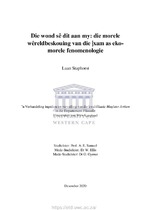Die wond sê dit aan my: die morele wêreldbeskouing van die |xam as eko-morele fenomenologie
Abstract
Despite the loss of speakers of |xam, one of the 28 Khoisan languages once spoken across Southern Africa, a part of the heritage of these speakers can be found in predominantly two archives: that of Wilhelm H. I. Bleek and Lucy Lloyd (1911) and Gideon R. von Wielligh (1919-1921). The archives form the heart of Bushman* Studies, and has long since received attention in, amongst others, anthropology, literature, and linguistics. This study presents an investigation into the ethical views of the |xam, an investigation which, with the single exception of the studies of Antjie Krog (2004-), has not been undertaken in a philosophical tradition. Through a comparative study of texts across archival boundaries, I engage critically with the ethical views of the |xam, specifically the phenomenological nature of these views. To this end, I use the hermeneutical approach in African philosophy, an approach which focuses on identifying and analysing concepts in texts. The approach to ‘reading’ |xam texts remains, however, a burning issue, and the limit to which disciplinary boundaries are appropriate, is debatable (Wessels 2010). Consequently, and as a result of the relative density of the available texts, insights from anthropology, literature, linguistics and rock art are incorporated within the comparative study. I secondly bring the ethical views which are identified through the comparative analysis into conversation with the dominant ethical framework in African philosophy, namely Ubuntu. Where Ubuntu as been ‘read’ through various lenses (Van Niekerk 2013), a phenomenological approach is absent. Further, where Ubuntu, African ethics broadly, is generally regarded as humanist, a salient ecological consciousness is present in the |xam views. A comparison between Ubuntu and the |xam views therefore deepens the discourse around African ethics in general, and further provides insights into the unique nature of the ethical views of the |xam in particular. Through this I attempt to add value both to Bushman Studies and African philosophy, whilst highlighting an important voice unique to Africa which could be added to the burning discussion around ecological decay in the time of the Anthropocene.

